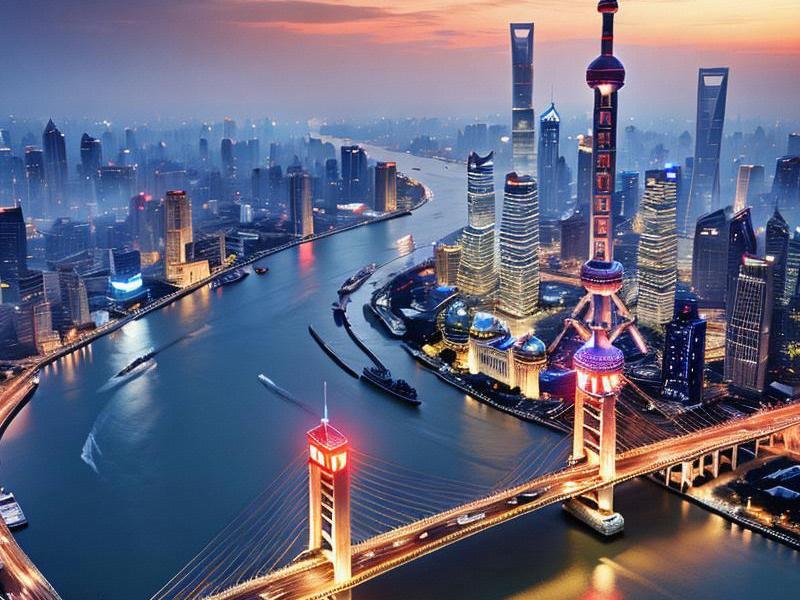This article delves into the multifaceted aspects of Shanghai, exploring its transformation from a traditional port city to a global metropolis. It highlights the city's economic prowess, cultural vibrancy, technological advancements, and urban development, showcasing why Shanghai continues to be a beacon of opportunity and inspiration.

Shanghai, a name that resonates with the rhythm of modernity and the echoes of history, stands as a testament to China's remarkable journey of economic reform and global integration. This dynamic city, with its skyline of shimmering skyscrapers and its intricate network of canals, is not just a geographical location but a symbol of China's aspirations and achievements.
The story of Shanghai is one of transformation. Once a modest fishing village, it rose to prominence in the 19th century as a treaty port, opening its doors to international trade and cultural exchange. This period of foreign influence left an indelible mark on the city's architecture, cuisine, and lifestyle, creating a unique blend of East and West that is still evident today.
In the 20th century, Shanghai became the industrial and financial heart of China, a position it continues to hold in the 21st century. The city's strategic location along the Yangtze River Delta has made it a hub for commerce, logistics, and manufacturing. Its port, one of the busiest in the world, serves as a gateway for goods and services, connecting China to the global market.
The economic engine of Shanghai is powered by its robust industrial base and a thriving service sector. The city is home to a diverse range of industries, including finance, technology, automotive, and fashion. The Shanghai Stock Exchange is a key player in the global financial market, while the city's tech parks and innovation hubs are incubators for startups and enterprises driving the digital revolution.
上海龙凤论坛419 Shanghai's skyline is a visual representation of its economic success. The iconic Oriental Pearl Tower, the futuristic Shanghai Tower, and the elegant Jin Mao Tower are just a few examples of the city's architectural marvels. These structures not only serve as landmarks but also house offices, hotels, and residential spaces, reflecting the city's status as a global business center.
However, Shanghai's allure extends beyond its economic achievements. The city is a cultural melting pot, where traditions meet modernity. The Bund, with its historic architecture and stunning views of the Pudong skyline, is a popular spot for both locals and tourists. The Yu Garden, a classical Chinese garden, offers a glimpse into the city's rich cultural heritage.
Shanghai's culinary scene is another aspect that captivates visitors. From the bustling night markets to the upscale restaurants, the city offers a wide array of dining experiences. The local cuisine, known as Shanghainese cuisine, is characterized by its sweet and savory flavors, with signature dishes like Xiaolongbao (soup dumplings) and Shengjianbao (pan-fried buns).
The city's commitment to innovation is evident in its efforts to become a smart city. Shanghai is at the forefront of integrating technology into urban life, with initiatives aimed at improving transportation, energy efficiency, and public services. The city's metro system, one of the most extensive in the world, is a model of efficiency and sustainability.
上海贵族宝贝龙凤楼
Shanghai's urban development is guided by a vision of sustainable growth. The city has implemented policies to reduce pollution, promote green spaces, and enhance the quality of life for its residents. The construction of the Huangpu River waterfront and the expansion of the Shanghai World Expo Park are examples of how the city is balancing development with environmental considerations.
Education and research are also priorities for Shanghai. The city is home to prestigious universities and research institutions, attracting students and scholars from around the world. These institutions contribute to the city's intellectual capital and drive innovation in various fields.
Shanghai's role in global affairs is significant. It is a member of the World Expo, the Asian Infrastructure Investment Bank, and the United Nations' Global Compact. The city's leadership in international organizations underscores its importance as a global player.
爱上海419 The people of Shanghai are the heart of the city. Their resilience, adaptability, and entrepreneurial spirit have been instrumental in shaping the city's identity. The local culture is characterized by a blend of traditional values and modern aspirations, creating a unique social fabric.
Shanghai's future is bright, with opportunities for further growth and development. The city is poised to become a leader in sustainable urbanization, technological innovation, and cultural exchange. Its vision for the future includes enhancing its global connectivity, fostering a vibrant creative economy, and improving the well-being of its residents.
In conclusion, Shanghai is a city that embodies the spirit of China's transformation. It is a place where the past and present coexist, where tradition and modernity blend seamlessly, and where opportunities abound. As Shanghai continues to evolve, it remains a source of inspiration and a model for other cities around the world.
The story of Shanghai is not just about economic growth; it is about the human spirit, the pursuit of dreams, and the creation of a better future. This global metropolis, with its endless charm and opportunities, stands as a beacon of hope and progress in an ever-changing world.